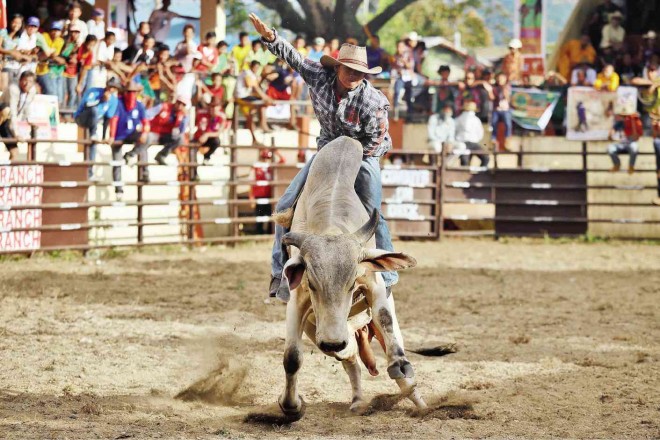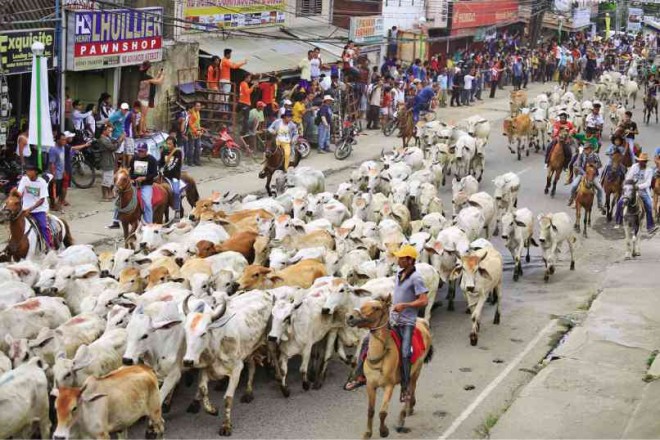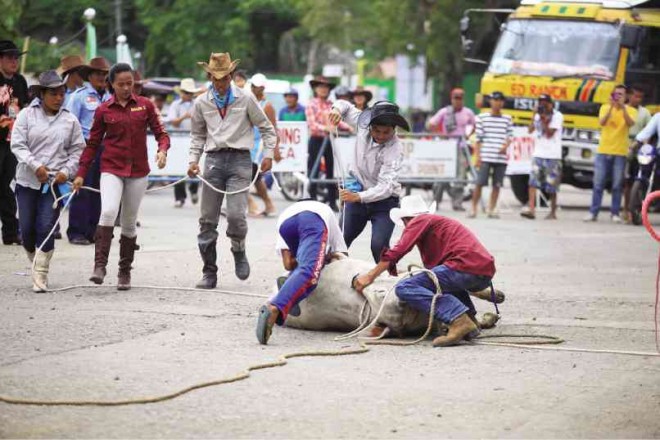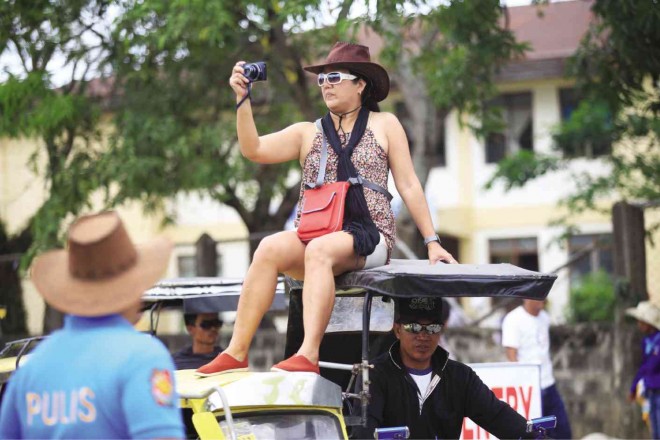No mad cows in Masbate rodeo

A CONTESTANT tries to bring down a cow the fastest way without falling down in a bull-riding competition during the Masbate rodeo held in Masbate City on Wednesday. PHOTOS BY MARK ALVIC ESPLANA
On Tuesday, Masbate City transformed into a western country, “where men are cowboys, women are cowgirls and cows are not mad,” as the events of the Rodeo Festival started to unfold here.
It’s the time of year again in the island-province of Masbate when donning western-style cowboy and cowgirl fashion of plaid shirts, corduroy and denim pants, boots, hats, exquisite belt buckles, bandanas, chaps, spurs on boots and bolo ties are a must attire.
From ordinary folk to local government officials, the hint or full regalia of cowboy and cowgirl fashion is there.
All over the city, the festive mood is heralded by posters of this year’s festival theme for everyone to enjoy the various events lined up for the April 14-18 duration of the rodeo.
Rodeo director Leo Gozum said the events and competitions in the festival, which showcase the work routine of ranch workers, seek to “bring out from obscurity” the cattle-raising industry in the province.
Article continues after this advertisementThe events include cattle wrestling, whip cracking, bull riding, lassoing, casting down (three players bring down a cow with a rope) and carambola (usually involving two to four persons capturing a bull with bare hands).
Article continues after this advertisementJomar Rabida, 27, a bachelor of science in husbandry student of the Masbate-based Dr. Emilio B. Espinosa Sr. Memorial State College of Agriculture and Technology (DEBESMSCAT), said he has been competing for four years now in the annual rodeo competitions, starting from his freshman year in college.
He said taking part in the competitions helped him enhance his knowledge about rodeo but more importantly, it is a source of pride for a Masbateño like himself. “For me, the Rodeo Festival is one of the best (festivals) in the country,” he said.
The rodeo competitions were not limited to male competitors.
Irene Versoza, 29, a member of the all-female team from DEBESMSCAT on Wednesday competed in the women category of the casting down event.
Versoza, an agriculture student majoring in animal science, said she started as a spectator but eventually developed a passion for the casting down event and is now on her second year as a competitor.
Gozum dismissed claims of animal rights activists on the alleged harm to the cattle used in the skills competition of the festival.
“But that’s the way they do it in the ranch,” he explained, even as he stressed that no cattle is being hurt during the festival.
Gozum said four months before the festival, they borrowed the “healthy ones” from ranches all over Masbate for the 270 cattle of different sizes used in the festival.
Cattle drive
The cattle drive, a festival highlight held on Wednesday, is different from the bull run in Pamplona, Spain, but is rooted in a practice of ranchers in the province, explained Masbate Regional Trial Court Judge Manuel Sese, the president of Rodeo Masbateño Inc. (RMI), a nonprofit, nonstock group handling the rodeo festival.
Cattle drive “is the reenactment of the practice of Masbate ranchers in the old days of bringing herds of cattle to the port,” he said.
In the old days when ranchers herded hundreds of cattle to the city port about hundreds of kilometers away from their ranches, Sese said that the cowboys would stop their herd before entering the city proper to warn business establishments along the way, of their arrival, to avoid damage to their property.
He said horseback-riding cowboys would shout “balanse, balanse,” which literally means to keep the cattle at the center of the road; as well as a warning for everyone to keep their distance as the herd thundered their way to the ship waiting at the port.

Rodeo Festival’s cattle drive is a reenactment of the practice of Masbate ranchers in the old days of bringing herds of cattle to the port.
Legacy
The Rodeo Festival, which is now on its 22nd year, is the legacy of late Gov. Emilio Espinosa who, along with RMI, envisioned that Masbate will be known for its cattle industry through the festival.
Lourdes Lilia “Maloli” Espinosa-Supnet, chair of festival marketing and promotion since 2013, said they hoped that Masbate would become known as the “Home of the Philippine Rodeo” in the league of such brands as the world-famous Sinulog Festival in Cebu.
“Masbate is a place with so much (potential) but because nobody knows about us, we are still here,” said Supnet, the daughter of another late governor, Moises Espinosa, the brother of Emilio.
She said beyond the brand, the festival also aims to promote Masbate as the source of organic beef.
All cattle from Masbate are fed purely on grass in the ranch, she said.
Tourism
Supnet said they also hoped to offer a tourism package that would allow visitors to not just enjoy the unique scenery of Masbate’s white beaches (island hopping and beach tours) but also to experience life in a cattle ranch, or be a cowboy or a cowgirl even for just a day or two.
She said she noticed in rodeo events and ranch tours in the United States, which she has visited, that tourists were offered only stories about the landmarks and significant places in the ranch and were not made to experience ranch life.
A ranch tour will include horseback riding and cattle herding, a bonfire and barbecue party, according to Sese.
Sese said Masbate has around 130 ranchers with over 40,000 heads of cattle.
Rodeo academy
Edgar Ramos, provincial director of the Department of Trade and Industry, said cattle production in Masbate is big business, with ranches occupying about 40 percent of the land area of the province.
Gozum said RMI is establishing a “rodeo academy” in a 9-hectare property to teach the community around the ranch how to raise cattle in the backyard.
“The problem in Masbate is that we have so many cattle but no one knows how to raise one or more heads in the backyard.”
He said the ranchers here practice paiwi wherein they let poor families adopt steers (young castrated bull calf), and raise and nurture them until they are sold.
Commonwealth period
Gozum said the cattle industry could be traced back to the Galleon trade during the Spanish period. He said the Spanish-era ranches survived until now, like the ranch owned by the Montague and Garcia families, although he admitted there is no existing record to prove this.
Bicol historian Danilo Madrid Gerona cited a Commonwealth document saying that in 1935, Masbate led the country’s livestock raisers with 100,190 cattle heads. However, over time the cattle population dwindled due to the unregulated shipment from Masbate to other regions and Metro Manila, he said.
The cattle raisers and ranchers are based in the towns of Milagros, Balud, Mandaon, Uson, Dimasalang, Palanas, Cawayan, Catingan, Placer, Esperanza, Masbate City and in the islands of Burias and Ticao. With a report from Virn Ivy del Valle, Contributor

